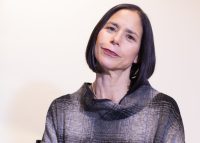Programmers' Notes

The cinema of the past year was rich in stories about the challenges of youth, with such Academy Award-nominated films as Call Me By Your Name, Lady Bird and The Florida Project. I’ve been drawn to some brilliant coming-of-age films screening at the Festival that bring the experiences of youth to life. As in this year’s Oscar nominees, these films depict unusual relationships with authority figures.
Promise At Dawn tells the story of Romain Gary, one of France’s most iconic novelists, growing up with a mother pushing him to achieve greatness. Gary is played beautifully by Pierre Niney, the youngest actor ever to receive a César Award (a French Academy Award).
In his first feature film Doubtful, Eliran Eliyah focuses on the development of a special bond between a troubled inner-city youth and his teacher.
One of the biggest surprises for me was Five Years After the War, and the interview of a young Parisian whose father, while absent, remains at the heart of his imagination. The filmmakers have done a splendid job recreating his inner world thru animation.
In these films, we experience the characters’ self-doubt and self-reflection while sharing the story with them.
On a different note, the Israeli TV show Juda is a personal favourite in this year’s line-up, where the world of vampires and gangsters intertwine in the streets of Tel Aviv.

‘I am woman, hear me roar” was the feminist rallying cry when I was growing up in the 1970s. Ironically, it has been the decidedly soft-spoken Ruth Bader Ginsburg who was responsible for some of the most pivotal contributions to the advancement of women’s rights over the last few decades. In a year where women have been galvanised to demand meaningful changes across all professions, the documentary RBG is compulsory viewing. While steadfastly adhering to her mother’s advice to “always be a lady”, Bader Ginsburg nevertheless succeeded in overcoming gender-associated obstacles on her path to become the second female in history to serve on the U.S. Supreme Court. There, she continues to challenge the legal status quo.
The Light of Hope presents us with another woman warrior, Elisabeth Eidenbenz. The director of a maternity hospital in Vichy France, Eidenbenz provided refuge to pregnant refugees and risked her own life to prevent the Pétain regime from closing its doors.
Heaven is a Traffic Jam on the 405 introduces us to Mindy Alper, a gifted artist who has overcome significant challenges to achieve success. Battling crippling depression and anxiety, Alper channels her inner demons into extraordinary drawings and large-scale papier-mâché sculptures. The film deservedly won the 2018 Oscar for best short documentary.
Finally, for a glimpse into a woman famous for her roar, don’t miss Barbara Streisand, Becoming an Icon.

While fiction films usually resonate with me most, it’s a pleasant surprise that the 2018 TJFF films that resonate with me the strongest are mainly documentaries.
I shed tears of joy watching the charming documentary Monkey Business: The Adventures of Curious George’s Creators. I loved Curious George as a child, but knew nothing about his German Jewish creators – Hans and Margret Ray. What struck me most was the powerful bond between these two seemingly opposites, and how they combined their contrasting talents to create something magical and enduring.
With few survivors still alive, what role will monuments and museums play in shaping how Jews and non-Jews understand the Shoah? This question, which I find particularly resonant, is explored in two eye-opening documentaries – the short Six After Seventy and the feature Saving Auschwitz?. Both films intelligently grapple with the political and cultural forces that are changing how memorial sites function as witnesses to the Holocaust.
The Invisibles is a hybrid documentary that combines interviews with well-acted re-enactments. It traces the experiences of four young Jews who survived the Nazis by hiding in Berlin. This fascinating film about a little-known chapter of the Shoah is an affecting look at the bravery of the young survivors and the non-Jews who helped them.
The above documentaries are just a few of the many films you can enjoy at this year’s TJFF. Happy watching!

Family is always a popular theme in the movies submitted to TJFF. Often, this means a film made by a family member about a grandparent, parent, sibling or other relative. And while these films are often made with love, they aren’t always the best-made films. But every so often an amazing film shows up.
In The Last Goldfish filmmaker Su Goldfish investigates her own personal history through that of her father’s. Her film is a stunning visual exploration of hidden secrets, told through old family photos and videos. I loved feeling like I was right there with her on her emotional journey to uncover a difficult and joyful past.
But this year, my favourite film is Elish’s Notebooks, a family story made by a grandson. This documentary offers a fascinating and compelling story, beautifully realized. Filmmaker Golan Rise gives us an honest and raw family saga without getting sentimental or schmaltzy. He unravels a multi-layered story, which goes beyond just a personal family history. Elish’s Notebooks is a sociological examination of seven siblings, each uniquely dealing with having grown up on a kibbutz with an emotionally dysfunctional mother. A bizarre and captivating story that I still can’t stop thinking about!
When family members are able to combine skilful filmmaking with touching stories that only they can tell, the results are amazing works of art that are as engaging as they are beautiful.

This year I’m proud that we are offering films that dig into very raw experiences of Mizrahi Jews around the world. Jewish and non-Jewish filmmakers from the Islamic world are finally bringing impressive and striking portraits of this community to the silver screen.
Nabil Ayouche’s Razzia is a gorgeous portrait of contemporary Morocco, told through the experiences of five quintessential figures. While all hailing from very different upbringings and social circles, Ayouche achieves a remarkable feat in showing how they all dream and hope in the same way, working for a better version of their country and a better version of themselves.
David Deri’s The Ancestral Sin shows the unfortunate side of the Mizrahi experience, when Moroccan and other Mizrahi Jews came to Israel under a false promise of a better life in The Promised Land. This masterpiece of reportage delves into the Zionist Archives, revealing troubling evidence about how systematic disenfranchisement was facilitated by the governing bodies of the time.
And finally, Fiona Murphy’s Remember Baghdad tells a story of return. For thousands of years Jewish communities thrived in the Middle East and lived mostly peaceful lives with their non-Jewish neighbours. The wave of political-nationalism, Zionism and Israel’s wars with her neighbours, saw the uprooting and displacement by the governing bodies of the time. This heart-warming documentary shows Iraqi Jews remembering their homeland, and one man who is leading the return of Jews back to Iraq.